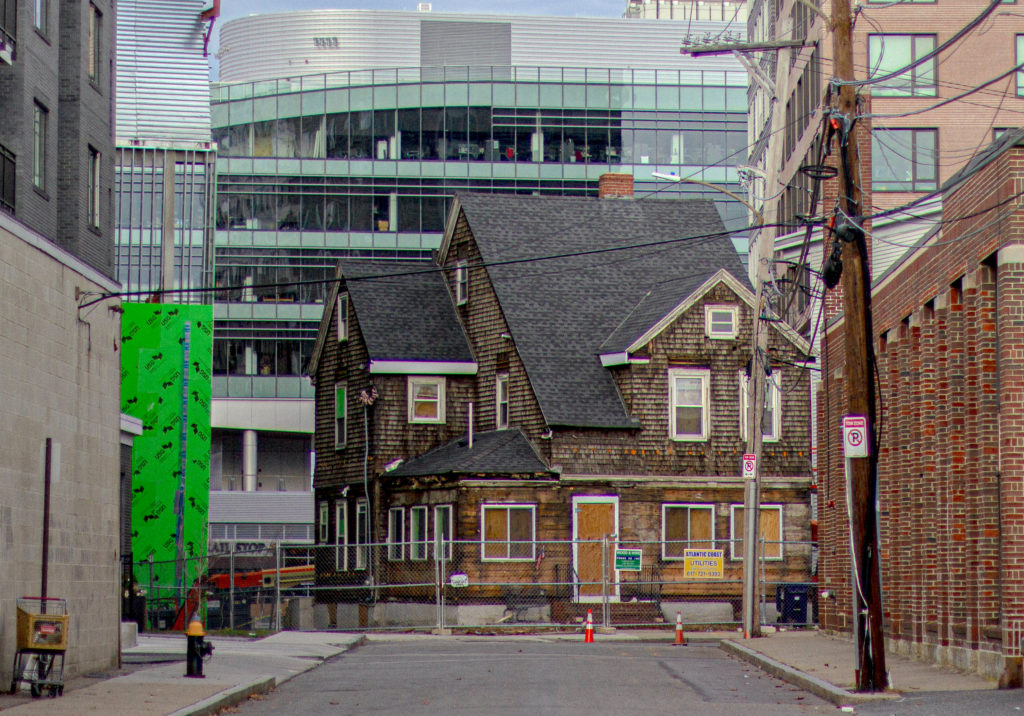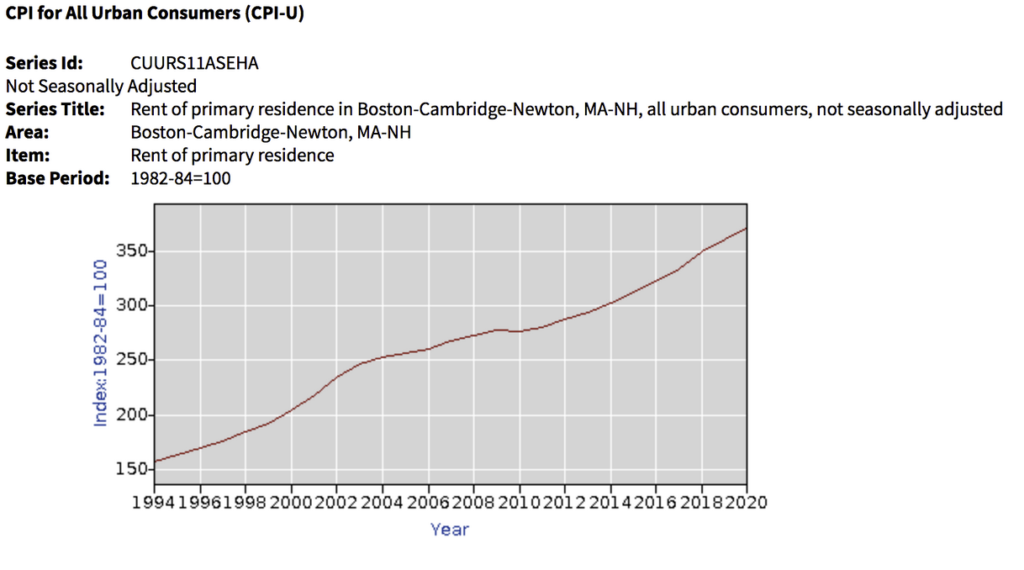
“Allston Nail House” by Jak Ritger, photographed in Winter 2020 at Allston – Brighton’s Boston Landing Development Complex
In November 1994, rent control became illegal in Massachusetts through a state-wide ballot question. Although the outcome would only affect Boston, Brookline and Cambridge, the suburban residents were asked to weigh in on the issue. “Question 9,” which would ban rent control, failed in Boston, Brookline, and Cambridge; however, it narrowly won the state by 51 percent, mostly from the wealthier suburbs.¹
In recent years, rent control has reappeared in the state house. In the last legislative session, 2019-2020, the Joint Committee on Housing reported favorably on bills H.3924, “An Act Enabling Local Options for Tenant Protections ” and H.1316 “An Act Relative to the Stabilization of Rents in Towns and Cities Facing Distress in the Housing Market.” Both bills would amend Chapter 40p of the Massachusetts General Law, which prohibits rent control. After favorable reports from the Housing Committee, the bills went to the Committee on Steering, Policy, and Scheduling in June of 2020, where no action was taken, effectively killing the bills.
Now in legislative session 2021-2022, bills H.3924 and H.1316 have new numbers and there is another chance for rent control in Massachusetts. In March, the bills were assigned to the Housing Committee and there will be a public hearing and period for the public to submit written testimony. The date of the public hearing has yet to be announced. After the public hearing, the Housing Committee will report on the bills. If the Housing Committee reports favorably on the bills, they will go to the Steering Policy and Scheduling Committee. If Steering and Policy approves the bills, the House will vote; if the House passes the bills, the Senate will vote. There are also identical versions of both bills filed in the Senate; if these bills are approved, the Senate could vote on them before the House does.
There are a whole lot of “ifs” here, a huge one being: even if the House and the Senate decide to pass one of the bills, Governor Charlie Baker can always choose to veto it. The governor opposes rent control, saying “Rent control will stifle the production of new housing, that’s exactly the wrong direction we should go.”² The logic here is that the rent is high because there is a housing shortage. Following the law of supply and demand, if there is more available housing the price should go down. Maybe he hasn’t noticed, but without rent control for the past 27 years, the price of rent has gone up astronomically. According to the Consumer Price Index, it has gone up over 200% since 1994.

So what is the average citizen supposed to do here? What do these two bills really do? How are they different? Can we pass both? Here is my summation:
H.1378 (formerly H.3924) “An Act Enabling Local options for tenant protections ”
This bill gives cities and towns the option of regulating the rent at any price. This bill also provides cities and towns with the option to regulate tenant deposits and fees giving tenants the option to pay last month’s rent and the security deposit in installments. (An identical version of this bill is also filed in the senate under number S.886)
H.1440 (formerly h.1316) “An Act relative to the stabilization of rents and evictions in towns and cities facing distress in the housing market.”
This bill would give cities and towns the option to regulate the rent and specifies that the limit that cities and towns can impose on the rent increase should not exceed the annual change in the Consumer Price Index for the applicable area or 5 percent, whichever is less. (An identical version of this bill is also filed in the senate under number S.889)
Both bills would limit evictions to ”just cause,” meaning a landlord could not evict you in the middle of your lease for refusing to pay a rent increase.
So how will this play out? Members of the committees on Housing and Steering Policy and Scheduling can report favorably on both bills, but most likely the House and the Senate will only pass one of them. So which should it be? Both bills have attractive aspects. There is a third option, which is for the Housing Committee to amend the bills by combining them and reporting out one bill. In my opinion, this is the best solution, though it is not as simple. This will be a year long struggle through bureaucracy, but we must engage in this tedious, frustrating, complicated form of collective action. To disengage with bureaucracy is exactly what the landlords want you to do.
Below is a recommended plan of action:
Step 1 (Right now)
Find your legislators:
https://malegislature.gov/search/findmylegislator
Email your State Senators and Representatives and ask them to co-sponsor both bills. Copy and paste the following text and/or add your own testimonial:
“Hello, my name is ________, and I’m a resident in your district.
I’m calling on you to co-sponsor bills H.1378 and H.1440. Massachusetts residents need this legislation because homelessness, displacement, foreclosure and excessive rent burden are commonplace throughout the commonwealth. This housing emergency impacts all but the wealthiest of the commonwealth’s residents.
Thank you.”
Step 2 (Right now)
Email members of the Housing Committee and ask them to combine both bills. You can copy/paste all the email addresses and hit BCC to streamline the process. Copy and paste the following text:
“Hello, my name is ________, and I’m a Massachusetts resident.
I’m calling on you, as a member of the Joint Committee on Housing, to amend bills H.1378 and H.1440 by combining them into one bill. Massachusetts residents need the tenant protections outlined in both pieces of legislation.
Thank you.”
Joint Committee on Housing Members:
Step 3 (Date: TBA)
Public Hearing – Joint Committee on Housing
In the very near future, there will be a public hearing on both bills, most likely through zoom or something. Be present in that hearing and recommend to the committee that they amend bills H.1378 and H.1440 by combining them into one bill. Tell your story, impress upon the politicians the urgency of the situation. The greed of the property owning class must be checked, not next year, now.
Step 4 (Date: TBA)
Email the members of the members of the Steering Policy and Scheduling Committee and ask that they co-sponsor the bill that (hopefully) was reported favorably by the housing committee. This is where the rent control bills were killed in the last legislative session. There are new members in this committee now; do not let them make the same mistake.
Step 5 (Date: TBA)
Email and Senators and Representatives that have not co-sponsored the bill and call on them to co-sponsor the rent control bill. Ask them why they haven’t. I recommend being civil. Acting unruly lets politicians off easy. They have no obligation to respond to someone who is being unprofessional; you give them the upper hand. What is much scarier to politicians is politely asking them to explain themselves.
Step 6 (Date: TBA)
Assuming the House and Senate pass a bill on rent control, we must pressure Charlie Baker to pass the bill. His position on this is public. We must email his office before the bill gets to his desk. Call into WGBH Radio when the governor is live-on-the-air and ask about rent control.
The norm in this situation is for every politician in every office to put this off another year, to deny responsibility, to not take a stand either way and maintain their appeal to the property-owning residents of Massachusetts. We cannot let this happen. If a legislator does not respond to your email, email them again. If they still don’t respond, publicly pressure them on twitter. These are the tools at our disposal. Emailing and attending a public hearing is not as exhilarating as demonstrating in the street, but it is necessary. This issue requires focus, persistence, and patience. Every week the situation will change and we must adapt to whatever happens.
Further Actions to Address the Housing Crisis:
- Email your Representatives and Senators and tell them to co-sponsor bill H.2852 “An Act enabling a local option for a tax on vacant units in residential buildings” Every year the city approves the development of large luxury condominium buildings, displacing the previous residents who cannot afford the rent increase. Then, because the rent is so high in these buildings, so many units are left empty. This is unethical. Email your legislators and copy/paste the message below and/or add your own testimonial
“Hello, my name is ________, and I’m a resident in your district.
I’m calling on you to co-sponsor bill H.2852. “An Act enabling a local option for a tax on vacant units in residential buildings.” In the current housing emergency, it is unethical that so many units are left vacant. These units should be properly taxed.
Thank you”
- Consider joining a tenants organization through the Boston Democratic Socialists of America https://www.bostondsa.org/priorities/
Sources:
- Cantor, Patricia. March 1, 1995. “How Cambridge Lost Rent Control.” https://shelterforce.org/1995/03/01/25-years-ago-tenants-organized-formed-coalitions-took-to-the-streets-and-won-rent-control-in-massachusetts/
- Lisinski, Chris. March 26, 2019. “Gov. Charlie Baker says he opposes rent control proposals” https://www.metrowestdailynews.com/news/20190326/gov-charlie-baker-says-he-opposes-rent-control-proposals


there’s a movement to pressure the city on these & stronger housing issues as well—Cancel the Rents Boston. They organize marches and other actions to pressure the city to listen to us. We have to make noise if we want rhis to work! https://m.facebook.com/events/2971684186444825?ref=m_notif¬if_t=admin_plan_mall_activity
Controlling rents isn’t gonna increase the housing supply.